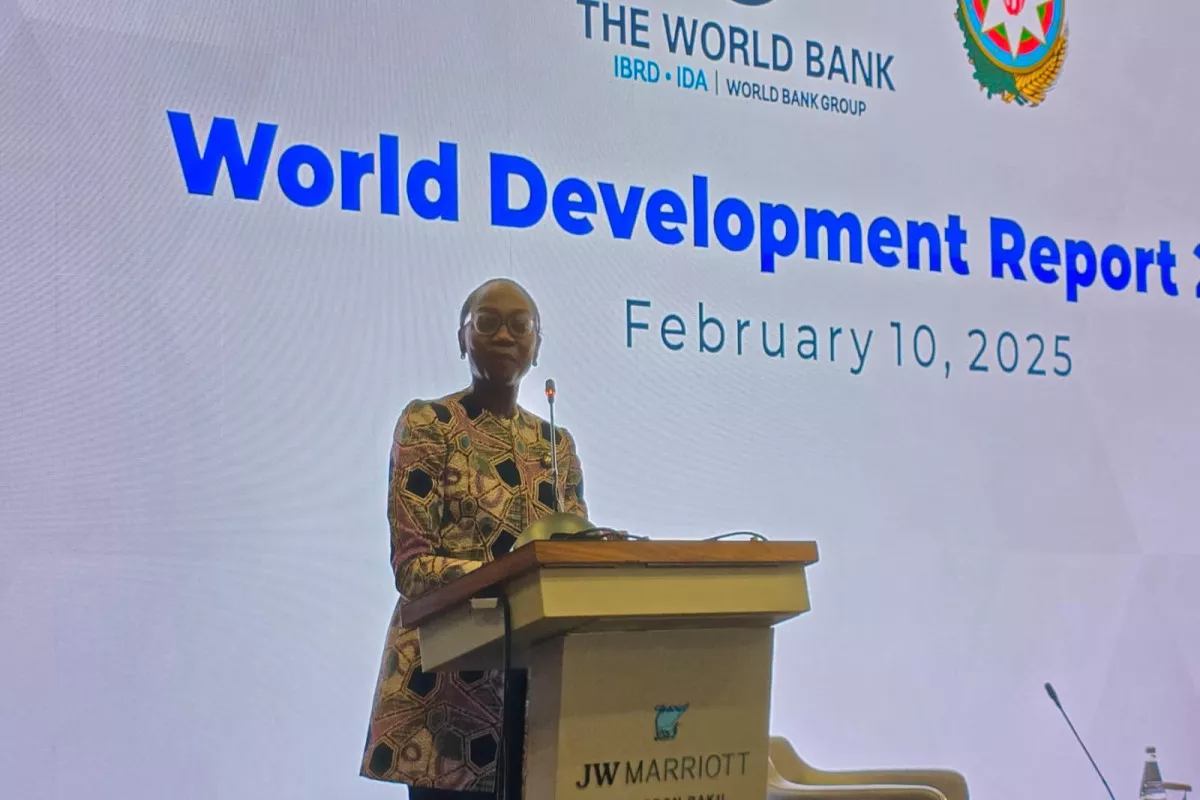World Bank and Azerbaijan: How to overcome the "middle-income trap"? Caliber.Az review
Having overcome the negative effects of the recession and inflation in the previous two years, Azerbaijan's economy, particularly its non-oil sector, showed steady growth throughout 2024, increasing by 6%. Positive developments in foreign currency reserves, government support for the development of agro-industrial clusters, and substantial budgetary investments in construction projects in the Karabakh region provided a strong impetus for further growth in domestic companies.
However, as a country with an upper-middle-income level, Azerbaijan aims to reform its economy and achieve high-income status. The transformations the country needs to undergo to reach this goal were discussed at the World Bank's presentation of the 2024 World Development Report held on February 10.
The presentation of the World Bank's annual World Development Report (WDR) on global development, which took place on February 10 in Baku, was presented under the slogan "The Middle-Income Trap." The report provides an in-depth analysis of the problems and opportunities faced by developing countries in overcoming the risks of inertia factors that keep development at the middle-income level and, conversely, achieving the status of high-income nations.
"In 1993, Azerbaijan's per capita income stood at just $110. By 2023, the country had transformed into a middle-income nation, with per capita income soaring to $6,660—60 times higher—according to the Atlas method for GNI per capita. This remarkable growth is largely due to Azerbaijan's effective use of its natural resources. However, the country’s ambitions go far beyond this achievement. To attain high-income status, Azerbaijan must not only attract significant physical investments but also focus on the development of human capital, retention of talent, and institutional strengthening, all of which are essential for diversifying its economy," noted Roland Pryce, World Bank Regional Director for the South Caucasus, during the WDR report presentation.

In particular, the World Bank's report discusses the so-called "three I's" principles—investments, infusion (the spread of advanced knowledge and technologies), and innovation. The World Bank urges developing countries to improve the investment climate to stimulate the flow of both domestic and foreign investments, including in quality education and professional training programs, to ensure a highly skilled workforce for production, design, and science that meets market needs. Equally important are transformations in attracting and disseminating new ideas and technologies from abroad, fostering competition and development among local market leaders, and encouraging their integration into the global market and participation in the international division of labour. Finally, it is essential at the government level to encourage and support equal competitive opportunities for local companies engaged in research and implementing know-how.
According to a World Bank representative, many countries are experiencing stagnation and struggling to transition from the middle-income category to a higher one. Since the 1990s, only 34 middle-income countries have managed to make such a transition. The remaining 108 countries of the world, as of the end of 2023, remained stuck in the middle-income trap. The World Bank report states that, under current conditions, it is extremely difficult for a country to upgrade its status to that of developed nations due to high levels of debt and an ageing population in developing countries, as well as growing protectionism in countries with highly developed economies.
Despite the aforementioned obstacles, Azerbaijan has strengthened its positions in the region politically and economically over the past thirty years, thanks to successful reforms and a consistent state policy aimed at development. The country has transitioned from poverty to a stable and economically strong state, managed to restore its territorial integrity and sovereignty, and is currently among the 54 middle-income countries in the world.
"Since joining the World Bank in 1992, Azerbaijan has undergone significant transformations, evolving from a recipient of foreign aid to a state that provides financial assistance," noted Shahmar Movsumov, Head of the Economic Affairs and Innovative Development Policy Department at the Presidential Administration, during the WDR report presentation. "The diversification of the domestic economy became a response to critical challenges: while in 2011, the share of the non-oil sector in GDP was 49%, by 2024, it had reached 68%, and this tangible dynamic resulted from efforts to build a more balanced and resilient economy."
The department head emphasized that the World Bank has been a very important partner for Azerbaijan over the years, supporting reforms in areas such as agriculture, healthcare, education, infrastructure, and transportation, as well as digital transformation. The latter is an extremely important development vector for modern civilization, and in the future, the World Bank will continue to be one of Azerbaijan's key partners in supporting innovative development.

Notably, innovative development, including the formation of IT infrastructure and software businesses, the implementation of digitalization processes in government management and private business, components of Industry 4.0, and the "green" economy, is now recognized as the key development vector for civilization. According to the Chairman of the Central Bank of Azerbaijan (CBA), Taleh Kazimov, who participated in the World Bank report presentation, digitalization and the diversification of financial instruments, as well as investing in advanced Fintech technologies, are crucial: "By effectively utilizing Azerbaijan's strong and stable financial sector, it is possible to avoid the middle-income trap." Overall, without breakthroughs in these areas, it will be extremely difficult for developing countries to enter the club of highly developed nations.
"Azerbaijan is ready to transition from the category of middle-income countries to high-income countries; this is a challenging task, but we are prepared," noted Shahmar Movsumov. "However, without economic diversification, we will not be able to maintain our leadership positions. Foreign technologies, e-commerce, digital solutions in the banking sector, expertise, and other advanced global practices are being successfully integrated into various sectors of our country."
The next important direction for ensuring long-term economic growth in Azerbaijan is innovative development, and according to Movsumov, with support for startups and innovative entrepreneurship, Azerbaijan will be able to become a country with a prosperous economy.








